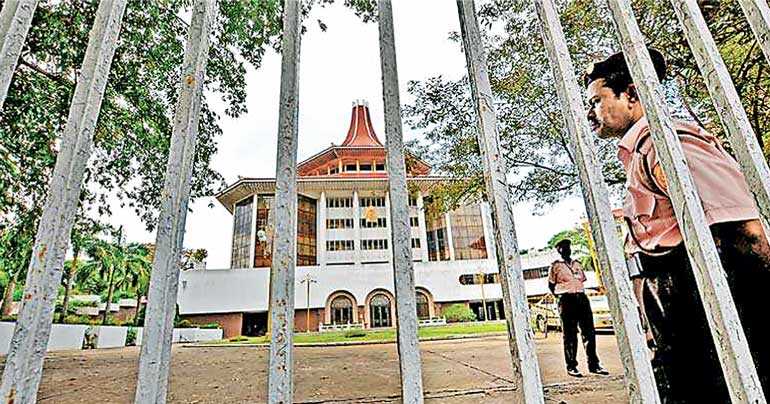Friday Feb 20, 2026
Friday Feb 20, 2026
Monday, 28 December 2020 00:00 - - {{hitsCtrl.values.hits}}

A caveat is the only protection that a genuine landowner has to his or her land, and also to someone who has a financial or commercial interest on a piece of land owned by a landowner who has had no interest in the land – Pic by Shehan Gunasekara
There is speculation that caveats, the one thing that protects genuine private landowners from fraudsters who manage to sell their land with bogus land titles, and protects genuine third parties from  exploitation by landowners, is under threat and that legislation is being drawn to change land registration laws that permit caveats on land titles.
exploitation by landowners, is under threat and that legislation is being drawn to change land registration laws that permit caveats on land titles.
It is unclear whether lawyers and notaries were consulted on this development. If not, it may seem that they are gradually being sidelined on law reform in Sri Lanka. If this indeed is an evolving trend, lawyers have to take some of the blame for this as they do not seem to have been engaged in furthering law reform in the country to the extent they should have.
It is understood that criminal lawyers are the dominant segment of the legal fraternity and lawyers engaged in land matters and other civil matters have not shown any inclination to introduce necessary reforms after the colonial masters left the island. This has prompted some lay persons to say that they have suffered the consequences as such lawyers have resisted even the thought of reform as they have benefited from outdated, and out of tune laws and legal procedures. Several lay persons have mentioned the length of some of their land-related court cases stretching to not just a few years, but decades in some instances.
The speculation about reforms to caveats has arisen on account of a recent cabinet decision reported as follows. It is understood that this, and the absence of more specific reasons as to why the cabinet took this decision, has given rise to confusion in legal circles. Many lay persons have also expressed dismay that the last bastion that safeguards genuine landowners and third parties could be a thing of the past. Worse, speculations extend to the possibility that the removal of caveats is either being done to benefit some major developers and directly or indirectly to benefit fraudsters.
In the circumstances, it is suggested to the Minister of Justice that he explains the background to this cabinet decision, the reasons why such a decision was taken and what specifically is going to be drafted by the legal draftsman in order to clarify, and allay fears that the legal fraternity and above all, genuine landowners have about the future of caveats.
Besides this, the writer views this development as another reason why the Government should formulate a clear, strategic and sustainable land management policy for Sri Lanka.
Land management has many dimensions as has been pointed out in previous articles written by this writer and by a host of others. Policy on management of State land, said to account for 82% of land in the country is one dimension. What exactly is included in the category of State land, the extent of such constituents and how best their management should be done to give the maximum long term and sustainable benefit to the country is a key area that needs attention. So far, appeals made to the Government via the many articles written have not borne any fruit. Managing State land via Gazette notifications seems to be the only avenue resorted to by the Government.
A policy on management of private land is the other dimension. Two key areas within this is the land registration law that needs urgent attention, Bim Saviya, and the most recent hot topic, caveats.
It is somewhat perplexing why the Ministry of Justice has sought it appropriate to direct its attention to what appears to be relatively less of an urgency in the overall scheme of deficiencies in land management, including the inoperable Bim Saviya.
While seeking the apology of readers for a pun on land management, the Ministry seems to be missing the woods for the trees here.
Registering land titles as per Bim Saviya has been a colossal failure as has been pointed out earlier. It is understood that basically anyone who produces a title, irrespective of whether it is genuine or a fraudulent one, a ‘hora oppuwa’ is able to have it registered in the electronic register or the eRegister. The old colonial Ordinance of 1927 governs the operation of the eRegister. This ordinance states that the Registrar is not responsible for the validity of deeds.
In case of fraudulent deeds that are so registered, the only recourse a genuine landowner has if and when the fraud is exposed, is to seek compensation from a compensation fund. The genuine landowner will not get the land back and there is no recourse to the courts to adjudicate on such matters.
In this context, a caveat is the only protection that a genuine landowner has to his or her land, and also to someone who has a financial or commercial interest on a piece of land owned by a landowner who has had no interest in the land. Unlike in the case of registering land deeds, the law is clear that registrars need to be satisfied that the landowner or a third party seeking a caveat has an interest in the land and the application is not a spurious one.
For example, a third party maybe owed money by a landowner who is attempting to sell the land without repaying what is owed to the third party or the third party may have been utilising the piece of land say for agricultural purposes where the landowner has shown no interest in the land for years. In such situations, the third party, with relevant and appropriate evidence could apply for a caveat to prevent the landowner from selling the piece of land.
Corruption in land registries of course could result in caveats being issued where applicable laws are stretched beyond what is procedurally, and legally acceptable and valid. For example, a fraudster who gets a bogus land deed done on a piece of land that he/she does not own, could have the deed registered and then a caveat issued on it prior to selling it to an unsuspecting person in order to seek a premium to have the caveat lifted. A third party may produce bogus evidence in support of a caveat in order to seek compensation from a landowner wishing to sell his/her land. The spoils probably shared with corrupt individuals in the land registration process.
If indeed the Ministry of Justice is attempting to prevent this type of illegal transactions, amendments to the Notaries ordinance and the Registration of Documents Ordinance is the answer. All land transactions should have the identities of owners registered like in all other countries. In fact, all land transactions should be governed by the Central Bank Financial Transactions Act 6 of 2006 that deals with suspicious transactions and which requires recording of the identities of the owners. Caveat system should be strengthened as this is the only recourse the less fortunate has to protect his or her land and also protects third parties from exploitation.
Minister must introduce modern laws to protect legitimate owners and third parties from fraud and exploitation. In the age of technology, these registration procedures must have safeguards that are used in electronic transactions which are replacing paper documents in land registries.
In some countries telephone alerts are given to owners, similar to the path followed by banks when credit card purchases take place. Many frauds can be prevented if alerts are given to genuine interested parties when new documents enter the registry. The Registrar should be made responsible for the validity of documents that are being registered. It is illogical for this not to be done. The removal of protective laws will obviously benefit the not genuine and disadvantage the genuine. Law revisions and remedies are needed to safeguard those who are genuine and not provide additional bonanzas to rogue elements.